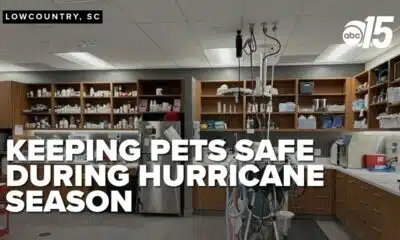Kaiser Health News
States Expand Health Coverage for Immigrants as GOP Hits Biden Over Border Crossings
Phil Galewitz, KFF Health News
Thu, 28 Dec 2023 10:00:00 +0000
A growing number of states are opening taxpayer-funded health insurance programs to immigrants, including those living in the U.S. without authorization, even as Republicans assail President Joe Biden over a dramatic increase in illegal crossings of the southern border.
Eleven states and Washington, D.C., together provide full health insurance coverage to more than 1 million low-income immigrants regardless of their legal status, according to state data compiled by KFF Health News. Most aren’t authorized to live in the U.S., state officials say.
Enrollment in these programs could nearly double by 2025 as at least seven states initiate or expand coverage. In January, Republican-controlled Utah will start covering children regardless of immigration status, while New York and California will widen eligibility to cover more adults.
“These are kids, and we have a heart,” said Utah state Rep. Jim Dunnigan, a Republican who initially opposed his state’s plan to cover children lacking legal status but relented after compromises including a cap on enrollment.
There are more than 10 million people living in the U.S. without authorization, according to estimates by the Pew Research Center. Immigrant advocates and academic experts point to two factors behind state leaders’ rising interest in providing health care to this population: The pandemic highlighted the importance of insurance coverage to control the spread of infectious diseases; and some states are focusing on people without legal status to further drive down the country’s record-low uninsured rate.
States have also expanded coverage in response to pleas from hospitals, lawmakers say, to reduce the financial burden of treating uninsured patients.
All states pay hospitals to provide emergency services to some unauthorized residents in emergency rooms, a program known as Emergency Medicaid. About a dozen states have extended coverage for only prenatal care for such people. Full state-provided health insurance coverage is much less common, but increasing.
An estimated half of the people living in the U.S. without authorization are uninsured, according to a KFF-Los Angeles Times survey. That’s more than five times the uninsured rate for U.S. citizens. Immigrants lacking authorization are ineligible for federal health programs. But states can use their own money to provide coverage through Medicaid, the state-federal insurance program for low-income people.
California was the first state to begin covering immigrants regardless of their legal status, starting with children in 2016.
“This is a real reflection of the conflict we have in the country and how states are realizing we cannot ignore immigrant communities simply because of their immigration status,” said Adriana Cadena, director of the advocacy group Protecting Immigrant Families. Many of the millions of people without permanent legal residency have been in the United States for decades and have no path to citizenship, she said.
These state extensions of health coverage come against a backdrop of rising hostility toward migrants among Republicans. The U.S. Border Patrol apprehended nearly 1.5 million people in fiscal year 2023 after they crossed the southern border, a record. GOP presidential candidates have portrayed the border as in crisis under Biden, and dangers of illegal immigration, like increasing crime, as the nation’s top domestic concern.
Simon Hankinson, a senior research fellow specializing in immigration issues with the conservative Heritage Foundation, said states would regret expanding coverage to immigrants lacking permanent legal residency because of the cost. Illinois, he noted, recently paused enrollment in its program over financial concerns.
“We need to share resources with people who contribute to society and not have people take benefits for those who have not contributed, as I don’t see how the math would work in the long run,” Hankinson said. “Otherwise, you create an incentive for people to come and get free stuff.”
Most adults lacking authorization work, accounting for about 5% of the U.S. labor force, according to the Pew Research Center. The state with the most unauthorized residents with state-provided health insurance is California, which currently covers about 655,000 immigrants without regard for their legal status. In January, it will expand coverage to people ages 26-49 regardless of their immigration status, benefiting an estimated 700,000 additional Californians.
Connecticut, Maine, Massachusetts, New York, Rhode Island, Vermont, Washington, D.C., and Washington state also provide full coverage to some people living in the U.S. without authorization. New York and Washington state are expanding eligibility next year.
Oregon, Colorado, and New Jersey in recent years began covering more than 100,000 people in total regardless of legal status. Minnesota will follow in 2025, covering an estimated 40,000 people.
While states are expanding coverage to people living in the U.S. potentially without authorization, some are imposing enrollment limits to control spending.
The cost of Utah’s program is capped at $4.5 million a year, limiting enrollment to about 2,000 children. Premiums will vary based on income but cost no more than $300 a year, with preventive services covered in full.
“The pandemic highlighted the need to have coverage for everybody,” said Ciriac Alvarez Valle, senior policy analyst for Voices for Utah Children, an advocacy group. “It will make a huge impact on the lives of these kids.”
Without coverage, many children use emergency rooms for primary care and have little ability to afford drugs, specialists, or hospital care, she said. “I am not sure if this will open the door to adults having coverage, but it is a good step forward,” Alvarez Valle said.
Colorado also limits enrollment for subsidized coverage in its program, capping it at 10,000 people in 2023 and 11,000 in 2024. The 2024 discounted slots were booked up within two days of enrollment beginning in November.
Adriana Miranda was able to secure coverage both years.
“You feel so much more at ease knowing that you’re not going to owe so much to the hospitals,” said Miranda, 46, who is enrolled in a private plan through OmniSalud, a program similar to the state’s Obamacare marketplace in which low-income Coloradans without legal residency can shop for plans with discounted premiums.
Miranda left Mexico in 1999 to follow her two brothers to the United States. She now works at Lamar Unidos, a nonprofit immigrant rights group.
Before she had health insurance, she struggled to pay for care for her diabetes and racked up thousands of dollars of debt following foot surgery, she said. Under the state program, she doesn’t pay a monthly premium due to her low income, with a $40 copay for specialist visits.
“I was really happy, right? Because I was able to get it. But I know a lot of people who also have a lot of need couldn’t get it,” she said.
OmniSalud covers only a small fraction of the more than 200,000 people living in Colorado without authorization, said Adam Fox, deputy director of the Colorado Consumer Health Initiative. But starting in 2025, all low-income children will be able to be covered by the state’s Medicaid or the related Children’s Health Insurance Program regardless of immigration status.
“There is a growing acknowledgement that people regardless of their immigration status are part of the community and should have access to health care in a regular, reliable manner,” Fox said. “If they don’t, it adds costs and trauma to the health systems and communities.”
KFF Health News senior audio producer Zach Dyer contributed to this report.
——————————
By: Phil Galewitz, KFF Health News
Title: States Expand Health Coverage for Immigrants as GOP Hits Biden Over Border Crossings
Sourced From: kffhealthnews.org/news/article/states-health-coverage-medicaid-immigrants-expansion/
Published Date: Thu, 28 Dec 2023 10:00:00 +0000
Kaiser Health News
States Brace for Reversal of Obamacare Coverage Gains Under Trump’s Budget Bill
Shorter enrollment periods. More paperwork. Higher premiums. The sweeping tax and spending bill pushed by President Donald Trump includes provisions that would not only reshape people’s experience with the Affordable Care Act but, according to some policy analysts, also sharply undermine the gains in health insurance coverage associated with it.
The moves affect consumers and have particular resonance for the 19 states (plus Washington, D.C.) that run their own ACA exchanges.
Many of those states fear that the additional red tape — especially requirements that would end automatic reenrollment — would have an outsize impact on their policyholders. That’s because a greater percentage of people in those states use those rollovers versus shopping around each year, which is more commonly done by people in states that use the federal healthcare.gov marketplace.
“The federal marketplace always had a message of, ‘Come back in and shop,’ while the state-based markets, on average, have a message of, ‘Hey, here’s what you’re going to have next year, here’s what it will cost; if you like it, you don’t have to do anything,’” said Ellen Montz, who oversaw the federal ACA marketplace under the Biden administration as deputy administrator and director at the Center for Consumer Information and Insurance Oversight. She is now a managing director with the Manatt Health consulting group.
Millions — perhaps up to half of enrollees in some states — may lose or drop coverage as a result of that and other changes in the legislation combined with a new rule from the Trump administration and the likely expiration at year’s end of enhanced premium subsidies put in place during the covid-19 pandemic. Without an extension of those subsidies, which have been an important driver of Obamacare enrollment in recent years, premiums are expected to rise 75% on average next year. That’s starting to happen already, based on some early state rate requests for next year, which are hitting double digits.
“We estimate a minimum 30% enrollment loss, and, in the worst-case scenario, a 50% loss,” said Devon Trolley, executive director of Pennie, the ACA marketplace in Pennsylvania, which had 496,661 enrollees this year, a record.
Drops of that magnitude nationally, coupled with the expected loss of Medicaid coverage for millions more people under the legislation Trump calls the “One Big Beautiful Bill,” could undo inroads made in the nation’s uninsured rate, which dropped by about half from the time most of the ACA’s provisions went into effect in 2014, when it hovered around 14% to 15% of the population, to just over 8%, according to the most recent data.
Premiums would rise along with the uninsured rate, because older or sicker policyholders are more likely to try to jump enrollment hurdles, while those who rarely use coverage — and are thus less expensive — would not.
After a dramatic all-night session, House Republicans passed the bill, meeting the president’s July 4 deadline. Trump is expected to sign the measure on Independence Day. It would increase the federal deficit by trillions of dollars and cut spending on a variety of programs, including Medicaid and nutrition assistance, to partly offset the cost of extending tax cuts put in place during the first Trump administration.
The administration and its supporters say the GOP-backed changes to the ACA are needed to combat fraud. Democrats and ACA supporters see this effort as the latest in a long history of Republican efforts to weaken or repeal Obamacare. Among other things, the legislation would end several changes put in place by the Biden administration that were credited with making it easier to sign up, such as lengthening the annual open enrollment period and launching a special program for very low-income people that essentially allows them to sign up year-round.
In addition, automatic reenrollment, used by more than 10 million people for 2025 ACA coverage, would end in the 2028 sign-up season. Instead, consumers would have to update their information, starting in August each year, before the close of open enrollment, which would end Dec. 15, a month earlier than currently.
That’s a key change to combat rising enrollment fraud, said Brian Blase, president of the conservative Paragon Health Institute, because it gets at what he calls the Biden era’s “lax verification requirements.”
He blames automatic reenrollment, coupled with the availability of zero-premium plans for people with lower incomes that qualify them for large subsidies, for a sharp uptick in complaints from insurers, consumers, and brokers about fraudulent enrollments in 2023 and 2024. Those complaints centered on consumers’ being enrolled in an ACA plan, or switched from one to another, without authorization, often by commission-seeking brokers.
In testimony to Congress on June 25, Blase wrote that “this simple step will close a massive loophole and significantly reduce improper enrollment and spending.”
States that run their own marketplaces, however, saw few, if any, such problems, which were confined mainly to the 31 states using the federal healthcare.gov.
The state-run marketplaces credit their additional security measures and tighter control over broker access than healthcare.gov for the relative lack of problems.
“If you look at California and the other states that have expanded their Medicaid programs, you don’t see that kind of fraud problem,” said Jessica Altman, executive director of Covered California, the state’s Obamacare marketplace. “I don’t have a single case of a consumer calling Covered California saying, ‘I was enrolled without consent.’”
Such rollovers are common with other forms of health insurance, such as job-based coverage.
“By requiring everyone to come back in and provide additional information, and the fact that they can’t get a tax credit until they take this step, it is essentially making marketplace coverage the most difficult coverage to enroll in,” said Trolley at Pennie, 65% of whose policyholders were automatically reenrolled this year, according to KFF data. KFF is a health information nonprofit that includes KFF Health News.
Federal data shows about 22% of federal sign-ups in 2024 were automatic-reenrollments, versus 58% in state-based plans. Besides Pennsylvania, the states that saw such sign-ups for more than 60% of enrollees include California, New York, Georgia, New Jersey, and Virginia, according to KFF.
States do check income and other eligibility information for all enrollees — including those being automatically renewed, those signing up for the first time, and those enrolling outside the normal open enrollment period because they’ve experienced a loss of coverage or other life event or meet the rules for the low-income enrollment period.
“We have access to many data sources on the back end that we ping, to make sure nothing has changed. Most people sail through and are able to stay covered without taking any proactive step,” Altman said.
If flagged for mismatched data, applicants are asked for additional information. Under current law, “we have 90 days for them to have a tax credit while they submit paperwork,” Altman said.
That would change under the tax and spending plan before Congress, ending presumptive eligibility while a person submits the information.
A white paper written for Capital Policy Analytics, a Washington-based consultancy that specializes in economic analysis, concluded there appears to be little upside to the changes.
While “tighter verification can curb improper enrollments,” the additional paperwork, along with the expiration of higher premiums from the enhanced tax subsidies, “would push four to six million eligible people out of Marketplace plans, trading limited fraud savings for a surge in uninsurance,” wrote free market economists Ike Brannon and Anthony LoSasso.
“Insurers would be left with a smaller, sicker risk pool and heightened pricing uncertainty, making further premium increases and selective market exits [by insurers] likely,” they wrote.
KFF Health News is a national newsroom that produces in-depth journalism about health issues and is one of the core operating programs at KFF—an independent source of health policy research, polling, and journalism. Learn more about KFF.
USE OUR CONTENT
This story can be republished for free (details).
KFF Health News is a national newsroom that produces in-depth journalism about health issues and is one of the core operating programs at KFF—an independent source of health policy research, polling, and journalism. Learn more about KFF.
Subscribe to KFF Health News’ free Morning Briefing.
This article first appeared on KFF Health News and is republished here under a Creative Commons license.
The post States Brace for Reversal of Obamacare Coverage Gains Under Trump’s Budget Bill appeared first on kffhealthnews.org
Note: The following A.I. based commentary is not part of the original article, reproduced above, but is offered in the hopes that it will promote greater media literacy and critical thinking, by making any potential bias more visible to the reader –Staff Editor.
Political Bias Rating: Center-Left
This content presents a critique of Republican-led changes to the Affordable Care Act, emphasizing potential negative impacts such as increased premiums, reduced enrollment, and the erosion of coverage gains made under the ACA. It highlights the perspective of policy analysts and state officials who express concern over these measures, while also presenting conservative viewpoints, particularly those focusing on fraud reduction. Overall, the tone and framing lean toward protecting the ACA and its expansions, which traditionally aligns with Center-Left media analysis.
Kaiser Health News
Dual Threats From Trump and GOP Imperil Nursing Homes and Their Foreign-Born Workers
In a top-rated nursing home in Alexandria, Virginia, the Rev. Donald Goodness is cared for by nurses and aides from various parts of Africa. One of them, Jackline Conteh, a naturalized citizen and nurse assistant from Sierra Leone, bathes and helps dress him most days and vigilantly intercepts any meal headed his way that contains gluten, as Goodness has celiac disease.
“We are full of people who come from other countries,” Goodness, 92, said about Goodwin House Alexandria’s staff. Without them, the retired Episcopal priest said, “I would be, and my building would be, desolate.”
The long-term health care industry is facing a double whammy from President Donald Trump’s crackdown on immigrants and the GOP’s proposals to reduce Medicaid spending. The industry is highly dependent on foreign workers: More than 800,000 immigrants and naturalized citizens comprise 28% of direct care employees at home care agencies, nursing homes, assisted living facilities, and other long-term care companies.
But in January, the Trump administration rescinded former President Joe Biden’s 2021 policy that protected health care facilities from Immigration and Customs Enforcement raids. The administration’s broad immigration crackdown threatens to drastically reduce the number of current and future workers for the industry. “People may be here on a green card, and they are afraid ICE is going to show up,” said Katie Smith Sloan, president of LeadingAge, an association of nonprofits that care for older adults.
Existing staffing shortages and quality-of-care problems would be compounded by other policies pushed by Trump and the Republican-led Congress, according to nursing home officials, resident advocates, and academic experts. Federal spending cuts under negotiation may strip nursing homes of some of their largest revenue sources by limiting ways states leverage Medicaid money and making it harder for new nursing home residents to retroactively qualify for Medicaid. Care for 6 in 10 residents is paid for by Medicaid, the state-federal health program for poor or disabled Americans.
“We are facing the collision of two policies here that could further erode staffing in nursing homes and present health outcome challenges,” said Eric Roberts, an associate professor of internal medicine at the University of Pennsylvania.
The industry hasn’t recovered from covid-19, which killed more than 200,000 long-term care facility residents and workers and led to massive staff attrition and turnover. Nursing homes have struggled to replace licensed nurses, who can find better-paying jobs at hospitals and doctors’ offices, as well as nursing assistants, who can earn more working at big-box stores or fast-food joints. Quality issues that preceded the pandemic have expanded: The percentage of nursing homes that federal health inspectors cited for putting residents in jeopardy of immediate harm or death has risen alarmingly from 17% in 2015 to 28% in 2024.
In addition to seeking to reduce Medicaid spending, congressional Republicans have proposed shelving the biggest nursing home reform in decades: a Biden-era rule mandating minimum staffing levels that would require most of the nation’s nearly 15,000 nursing homes to hire more workers.
The long-term care industry expects demand for direct care workers to burgeon with an influx of aging baby boomers needing professional care. The Census Bureau has projected the number of people 65 and older would grow from 63 million this year to 82 million in 2050.
In an email, Vianca Rodriguez Feliciano, a spokesperson for the Department of Health and Human Services, said the agency “is committed to supporting a strong, stable long-term care workforce” and “continues to work with states and providers to ensure quality care for older adults and individuals with disabilities.” In a separate email, Tricia McLaughlin, a Department of Homeland Security spokesperson, said foreigners wanting to work as caregivers “need to do that by coming here the legal way” but did not address the effect on the long-term care workforce of deportations of classes of authorized immigrants.
Goodwin Living, a faith-based nonprofit, runs three retirement communities in northern Virginia for people who live independently, need a little assistance each day, have memory issues, or require the availability of around-the-clock nurses. It also operates a retirement community in Washington, D.C. Medicare rates Goodwin House Alexandria as one of the best-staffed nursing homes in the country. Forty percent of the organization’s 1,450 employees are foreign-born and are either seeking citizenship or are already naturalized, according to Lindsay Hutter, a Goodwin spokesperson.
“As an employer, we see they stay on with us, they have longer tenure, they are more committed to the organization,” said Rob Liebreich, Goodwin’s president and CEO.
Jackline Conteh spent much of her youth shuttling between Sierra Leone, Liberia, and Ghana to avoid wars and tribal conflicts. Her mother was killed by a stray bullet in her home country of Liberia, Conteh said. “She was sitting outside,” Conteh, 56, recalled in an interview.
Conteh was working as a nurse in a hospital in Sierra Leone in 2009 when she learned of a lottery for visas to come to the United States. She won, though she couldn’t afford to bring her husband and two children along at the time. After she got a nursing assistant certification, Goodwin hired her in 2012.
Conteh said taking care of elders is embedded in the culture of African families. When she was 9, she helped feed and dress her grandmother, a job that rotated among her and her sisters. She washed her father when he was dying of prostate cancer. Her husband joined her in the United States in 2017; she cares for him because he has heart failure.
“Nearly every one of us from Africa, we know how to care for older adults,” she said.
Her daughter is now in the United States, while her son is still in Africa. Conteh said she sends money to him, her mother-in-law, and one of her sisters.
In the nursing home where Goodness and 89 other residents live, Conteh helps with daily tasks like dressing and eating, checks residents’ skin for signs of swelling or sores, and tries to help them avoid falling or getting disoriented. Of 102 employees in the building, broken up into eight residential wings called “small houses” and a wing for memory care, at least 72 were born abroad, Hutter said.
Donald Goodness grew up in Rochester, New York, and spent 25 years as rector of The Church of the Ascension in New York City, retiring in 1997. He and his late wife moved to Alexandria to be closer to their daughter, and in 2011 they moved into independent living at the Goodwin House. In 2023 he moved into one of the skilled nursing small houses, where Conteh started caring for him.
“I have a bad leg and I can’t stand on it very much, or I’d fall over,” he said. “She’s in there at 7:30 in the morning, and she helps me bathe.” Goodness said Conteh is exacting about cleanliness and will tell the housekeepers if his room is not kept properly.
Conteh said Goodness was withdrawn when he first arrived. “He don’t want to come out, he want to eat in his room,” she said. “He don’t want to be with the other people in the dining room, so I start making friends with him.”
She showed him a photo of Sierra Leone on her phone and told him of the weather there. He told her about his work at the church and how his wife did laundry for the choir. The breakthrough, she said, came one day when he agreed to lunch with her in the dining room. Long out of his shell, Goodness now sits on the community’s resident council and enjoys distributing the mail to other residents on his floor.
“The people that work in my building become so important to us,” Goodness said.
While Trump’s 2024 election campaign focused on foreigners here without authorization, his administration has broadened to target those legally here, including refugees who fled countries beset by wars or natural disasters. This month, the Department of Homeland Security revoked the work permits for migrants and refugees from Cuba, Haiti, Nicaragua, and Venezuela who arrived under a Biden-era program.
“I’ve just spent my morning firing good, honest people because the federal government told us that we had to,” Rachel Blumberg, president of the Toby & Leon Cooperman Sinai Residences of Boca Raton, a Florida retirement community, said in a video posted on LinkedIn. “I am so sick of people saying that we are deporting people because they are criminals. Let me tell you, they are not all criminals.”
At Goodwin House, Conteh is fearful for her fellow immigrants. Foreign workers at Goodwin rarely talk about their backgrounds. “They’re scared,” she said. “Nobody trusts anybody.” Her neighbors in her apartment complex fled the U.S. in December and returned to Sierra Leone after Trump won the election, leaving their children with relatives.
“If all these people leave the United States, they go back to Africa or to their various countries, what will become of our residents?” Conteh asked. “What will become of our old people that we’re taking care of?”
KFF Health News is a national newsroom that produces in-depth journalism about health issues and is one of the core operating programs at KFF—an independent source of health policy research, polling, and journalism. Learn more about KFF.
Subscribe to KFF Health News’ free Morning Briefing.
This article first appeared on KFF Health News and is republished here under a Creative Commons license.
The post Dual Threats From Trump and GOP Imperil Nursing Homes and Their Foreign-Born Workers appeared first on kffhealthnews.org
Note: The following A.I. based commentary is not part of the original article, reproduced above, but is offered in the hopes that it will promote greater media literacy and critical thinking, by making any potential bias more visible to the reader –Staff Editor.
Political Bias Rating: Center-Left
This content primarily highlights concerns about the impact of restrictive immigration policies and Medicaid spending cuts proposed by the Trump administration and Republican lawmakers on the long-term care industry. It emphasizes the importance of immigrant workers in healthcare, the challenges that staffing shortages pose to patient care, and the potential negative effects of GOP policy proposals. The tone is critical of these policies while sympathetic toward immigrant workers and advocates for maintaining or increasing government support for healthcare funding. The framing aligns with a center-left perspective, focusing on social welfare, immigrant rights, and concern about the consequences of conservative economic and immigration policies without descending into partisan rhetoric.
Kaiser Health News
California’s Much-Touted IVF Law May Be Delayed Until 2026, Leaving Many in the Lurch
California lawmakers are poised to delay the state’s much-ballyhooed new law mandating in vitro fertilization insurance coverage for millions, set to take effect July 1. Gov. Gavin Newsom has asked lawmakers to push the implementation date to January 2026, leaving patients, insurers, and employers in limbo.
The law, SB 729, requires state-regulated health plans offered by large employers to cover infertility diagnosis and treatment, including IVF. Nine million people will qualify for coverage under the law. Advocates have praised the law as “a major win for Californians,” especially in making same-sex couples and aspiring single parents eligible, though cost concerns limited the mandate’s breadth.
People who had been planning fertility care based on the original timeline are now “left in a holding pattern facing more uncertainty, financial strain, and emotional distress,” Alise Powell, a director at Resolve: The National Infertility Association, said in a statement.
During IVF, a patient’s eggs are retrieved, combined with sperm in a lab, and then transferred to a person’s uterus. A single cycle can total around $25,000, out of reach for many. The California law requires insurers to cover up to three egg retrievals and an unlimited number of embryo transfers.
Not everyone’s coverage would be affected by the delay. Even if the law took effect July 1, it wouldn’t require IVF coverage to start until the month an employer’s contract renews with its insurer. Rachel Arrezola, a spokesperson for the California Department of Managed Health Care, said most of the employers subject to the law renew their contracts in January, so their employees would not be affected by a delay.
She declined to provide data on the percentage of eligible contracts that renew in July or later, which would mean those enrollees wouldn’t get IVF coverage until at least a full year from now, in July 2026 or later.
The proposed new implementation date comes amid heightened national attention on fertility coverage. California is now one of 15 states with an IVF mandate, and in February, President Donald Trump signed an executive order seeking policy recommendations to expand IVF access.
It’s the second time Newsom has asked lawmakers to delay the law. When the Democratic governor signed the bill in September, he asked the legislature to consider delaying implementation by six months. The reason, Newsom said then, was to allow time to reconcile differences between the bill and a broader effort by state regulators to include IVF and other fertility services as an essential health benefit, which would require the marketplace and other individual and small-group plans to provide the coverage.
Newsom spokesperson Elana Ross said the state needs more time to provide guidance to insurers on specific services not addressed in the law to ensure adequate and uniform coverage. Arrezola said embryo storage and donor eggs and sperm were examples of services requiring more guidance.
State Sen. Caroline Menjivar, a Democrat who authored the original IVF mandate, acknowledged a delay could frustrate people yearning to expand their families, but requested patience “a little longer so we can roll this out right.”
Sean Tipton, a lobbyist for the American Society for Reproductive Medicine, contended that the few remaining questions on the mandate did not warrant a long delay.
Lawmakers appear poised to advance the delay to a vote by both houses of the legislature, likely before the end of June. If a delay is approved and signed by the governor, the law would immediately be paused. If this does not happen before July 1, Arrezola said, the Department of Managed Health Care would enforce the mandate as it exists. All plans were required to submit compliance filings to the agency by March. Arrezola was unable to explain what would happen to IVF patients whose coverage had already begun if the delay passes after July 1.
The California Association of Health Plans, which opposed the mandate, declined to comment on where implementation efforts stand, although the group agrees that insurers need more guidance, spokesperson Mary Ellen Grant said.
Kaiser Permanente, the state’s largest insurer, has already sent employers information they can provide to their employees about the new benefit, company spokesperson Kathleen Chambers said. She added that eligible members whose plans renew on or after July 1 would have IVF coverage if implementation of the law is not delayed.
Employers and some fertility care providers appear to be grappling over the uncertainty of the law’s start date. Amy Donovan, a lawyer at insurance brokerage and consulting firm Keenan & Associates, said the firm has fielded many questions from employers about the possibility of delay. Reproductive Science Center and Shady Grove Fertility, major clinics serving different areas of California, posted on their websites that the IVF mandate had been delayed until January 2026, which is not yet the case. They did not respond to requests for comment.
Some infertility patients confused over whether and when they will be covered have run out of patience. Ana Rios and her wife, who live in the Central Valley, had been trying to have a baby for six years, dipping into savings for each failed treatment. Although she was “freaking thrilled” to learn about the new law last fall, Rios could not get clarity from her employer or health plan on whether she was eligible for the coverage and when it would go into effect, she said. The couple decided to go to Mexico to pursue cheaper treatment options.
“You think you finally have a helping hand,” Rios said of learning about the law and then, later, the requested delay. “You reach out, and they take it back.”
This article was produced by KFF Health News, which publishes California Healthline, an editorially independent service of the California Health Care Foundation.
KFF Health News is a national newsroom that produces in-depth journalism about health issues and is one of the core operating programs at KFF—an independent source of health policy research, polling, and journalism. Learn more about KFF.
USE OUR CONTENT
This story can be republished for free (details).
KFF Health News is a national newsroom that produces in-depth journalism about health issues and is one of the core operating programs at KFF—an independent source of health policy research, polling, and journalism. Learn more about KFF.
Subscribe to KFF Health News’ free Morning Briefing.
This article first appeared on KFF Health News and is republished here under a Creative Commons license.
The post California’s Much-Touted IVF Law May Be Delayed Until 2026, Leaving Many in the Lurch appeared first on kffhealthnews.org
Note: The following A.I. based commentary is not part of the original article, reproduced above, but is offered in the hopes that it will promote greater media literacy and critical thinking, by making any potential bias more visible to the reader –Staff Editor.
Political Bias Rating: Center-Left
This content is presented in a factual, balanced manner typical of center-left public policy reporting. It focuses on a progressive healthcare issue (mandated IVF insurance coverage) favorably highlighting benefits for diverse family structures and individuals, including same-sex couples and single parents, which often aligns with center-left values. At the same time, it includes perspectives from government officials, industry representatives, opponents, and patients, offering a nuanced view without overt ideological framing or partisan rhetoric. The emphasis on healthcare access, social equity, and patient impact situates the coverage within a center-left orientation.
-
The Center Square6 days ago
Here are the violent criminals Judge Murphy tried to block from deportation | Massachusetts
-
News from the South - Kentucky News Feed6 days ago
Woman arrested in Morgantown McDonald’s parking lot
-
News from the South - Kentucky News Feed6 days ago
Cruising into Louisville: Viking cruise ship docks downtown on Ohio River
-
News from the South - Oklahoma News Feed6 days ago
Cell, no! After Two Years of Debate, Schools Get Months to Ban Phones
-
News from the South - Arkansas News Feed6 days ago
Arkansas and Oklahoma teams deploy to aid Texas floods
-
News from the South - South Carolina News Feed7 days ago
Keep your pets safe during hurricane season: experts share advice on go-bags and safe spaces
-
News from the South - North Carolina News Feed5 days ago
Learning loss after Helene in Western NC school districts
-
News from the South - Missouri News Feed6 days ago
The six-year saga of two cannabis facility licenses



















































